We had a fantastic time identifying research priorities with local older people at the ADRC coffee morning on 12th July 2023.
During the event we heard from Bournemouth University researchers (see below) about their projects. After lunch, we spent time discussing local issues and research gaps that were pertinent to the group. Attendees highlighted a wide range of topics from nutrition to knickers (yes really!). We hope to take forwards some of these ideas in our future research and are working with a smaller number of the group to discuss how they might become more involved in developing research as co-researchers – watch this space for further updates!
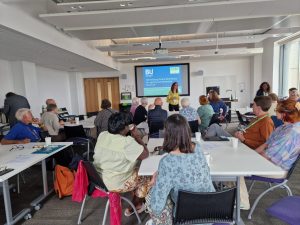
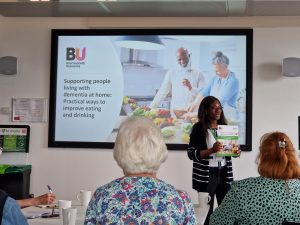
Thanks to all attendees and speakers for the engaging discussions which made the event so enjoyable:
- Strategies to promote activities of daily living in people with long term conditions. Matthew Armstrong
- Harnessing digital technologies to support older adults’ social wellbeing and inclusion. Catherine Talbot
- An exploration of the meaning of participation for older adults of diverse cultural backgrounds to inform student education. Büşra Yildiz
- Supporting people living with dementia at home: Practical ways to improve eating and drinking. Gladys Yinusa
- End of life care for people with dementia in care homes. Ashley Spriggs
- The need for culturally sensitive dementia education. Michele Board
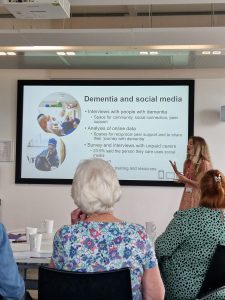
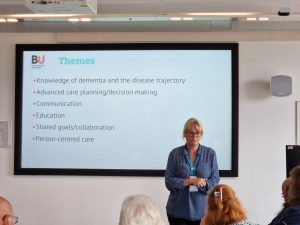
Thanks also to the British Society of Gerontology* (BSG) for funding this event under the Small Grant scheme!
If your research is focused on ageing or dementia and you would like to present at a future ADRC coffee morning please email adrc@bournemouth.ac.uk
*Please note the views expressed and discussions may not represent the views of the BSG. For more information about the BSG, visit https://www.britishgerontology.org/
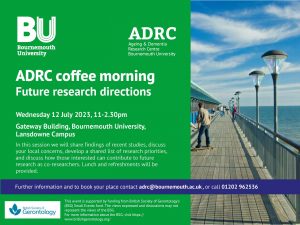
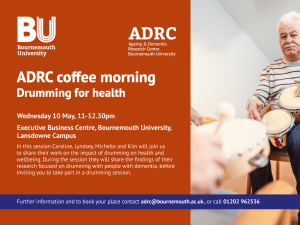
 oject is in 4 phases: Explore, Design and Develop, Test and Evaluate. October 2018 will see the SAIL project move into the third phase: Test. The visit to Hunstanton provided an opportunity to see at first hand the challenges which face the area in terms of supporting an aging population now and in the future. The Mayor of Hunstanton hosted an evening reception in the Town Hall to welcome the SAIL Research Team and to learn more about the progress which is being made.
oject is in 4 phases: Explore, Design and Develop, Test and Evaluate. October 2018 will see the SAIL project move into the third phase: Test. The visit to Hunstanton provided an opportunity to see at first hand the challenges which face the area in terms of supporting an aging population now and in the future. The Mayor of Hunstanton hosted an evening reception in the Town Hall to welcome the SAIL Research Team and to learn more about the progress which is being made.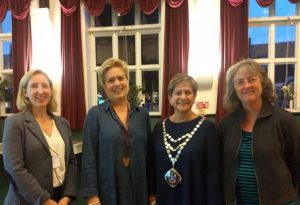


 “As a nutritionist, I became aware of the fact that there was growing evidence that under-nutrition, commonly known as malnutrition, is a prevalent problem for older people. The figures show that up to about 45 percent of older people living in residential care are at
“As a nutritionist, I became aware of the fact that there was growing evidence that under-nutrition, commonly known as malnutrition, is a prevalent problem for older people. The figures show that up to about 45 percent of older people living in residential care are at 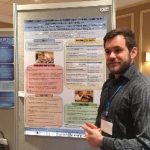
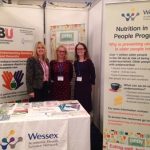
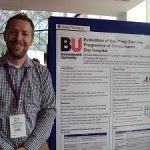













 Second NIHR MIHERC meeting in Bournemouth this week
Second NIHR MIHERC meeting in Bournemouth this week Dr. Ashraf cited on ‘Modest Fashion’ in The Guardian
Dr. Ashraf cited on ‘Modest Fashion’ in The Guardian NIHR-funded research launches website
NIHR-funded research launches website MSCA Postdoctoral Fellowships 2025 Call
MSCA Postdoctoral Fellowships 2025 Call ERC Advanced Grant 2025 Webinar
ERC Advanced Grant 2025 Webinar Horizon Europe Work Programme 2025 Published
Horizon Europe Work Programme 2025 Published Horizon Europe 2025 Work Programme pre-Published
Horizon Europe 2025 Work Programme pre-Published Update on UKRO services
Update on UKRO services European research project exploring use of ‘virtual twins’ to better manage metabolic associated fatty liver disease
European research project exploring use of ‘virtual twins’ to better manage metabolic associated fatty liver disease